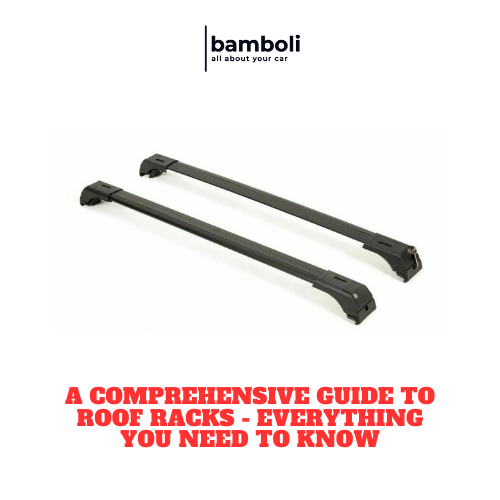A Comprehensive Guide to Roof Racks - Everything You Need to Know

If you're in need of some information about roof racks, you've come to the right place. Whether you're new to the world of roof racks or looking to upgrade, this comprehensive guide will cover everything you need to know. From types of roof racks to installation tips, we've got you covered.
Main Points
- A Comprehensive Guide to Roof Racks: Learn about the different types of roof racks available and their uses.
- Benefits of Roof Racks: Discover the advantages of using roof racks for your vehicle.
- Installation Tips: Get expert tips on how to properly install and secure your roof rack.
- Maintenance and Care: Learn how to maintain and care for your roof rack to ensure longevity.
Types of Roof Racks and Their Uses
Roof racks are an essential accessory for anyone who needs to transport items on the roof of their vehicle. There are several types of roof racks available, each designed for specific purposes. Here are some of the most common types:
- Cargo Baskets
Cargo baskets are open-air racks that are ideal for carrying bulky items such as luggage, camping gear, or sports equipment. They are perfect for providing extra storage space on long road trips or outdoor adventures. Versatile, spacious, practical
- Roof Trays
Roof trays have a flat surface and raised edges, making them perfect for securing smaller items like bicycles, kayaks, or skis. They are great for keeping your gear organized and protected while on the go. Secure, compact, durable
- Kayak Racks
Kayak racks are specifically designed to transport kayaks safely and securely. They typically have padded cradles and straps to hold the kayak in place, preventing any damage during transit. Sturdy, protective, adjustable
- Ski Racks
Ski racks are designed to securely hold skis and snowboards in place during transportation. They usually have rubber padding to protect the equipment and prevent any scratches. Convenient, efficient, cushioned
- Bike Racks
Bike racks are perfect for cyclists who need to transport their bicycles to different locations. They come in various styles, such as roof-mounted, trunk-mounted, or hitch-mounted racks, offering flexibility depending on your needs. Versatile, easy-to-use, adjustable
- Ladder Racks
Ladder racks are designed for contractors or tradespeople who need to transport ladders or other long items safely. They feature adjustable crossbars that can accommodate different sizes and types of ladders. Sturdy, reliable, adjustable
Whatever your transportation needs may be, there is a roof rack available to suit your requirements. Make sure to choose the right type of rack based on the items you need to transport and the frequency of use. With the right roof rack, you can easily and safely transport your gear wherever your adventures take you.
Factors to Consider When Choosing a Roof Rack
When it comes to choosing a roof rack for your vehicle, there are several important factors to consider. By taking these factors into account, you can ensure that you select the best roof rack for your needs.
- Vehicle Compatibility
One of the most important factors to consider when choosing a roof rack is the compatibility with your vehicle. Not all roof racks are designed to fit every type of vehicle, so it is important to check the specifications and make sure that the roof rack you choose is compatible with your car or SUV.
- Type of Mounting System
Another important factor to consider is the type of mounting system that the roof rack uses. There are several different types of mounting systems available, including crossbar systems, roof rail systems, and gutter systems. It is important to choose a mounting system that is secure and easy to install on your vehicle.
- Weight Capacity
The weight capacity of the roof rack is another crucial factor to consider. You should determine how much weight you will need to carry on the roof rack, including any equipment or accessories. Make sure to choose a roof rack that has a weight capacity that is suitable for your needs.
|
Factor |
Consideration |
|
Vehicle Compatibility |
Check specifications to ensure compatibility |
|
Type of Mounting System |
Choose a secure and easy-to-install mounting system |
|
Weight Capacity |
Consider how much weight you will need to carry |
By considering these important factors, you can choose a roof rack that is the best fit for your vehicle and meets your needs for carrying additional cargo or equipment.
Installation Guide for Roof Racks
Installing roof racks on your vehicle can be a simple process if you follow these steps carefully. It is important to take your time and ensure that the roof racks are securely attached to your vehicle to avoid any accidents while driving.
Step 1: Gather the Necessary Tools
Before you begin, make sure you have all the necessary tools for installation. You will typically need a screwdriver, measuring tape, and the roof rack kit that fits your vehicle.
Step 2: Measure and Align
Start by measuring the distance between the roof rails on your vehicle. Use this measurement to align the roof rack feet properly before installation. Make sure the rack is centered and symmetrical on both sides.
Step 3: Secure the Roof Rack
Once the roof rack is aligned, use the provided screws and brackets to secure the feet to the roof rails. Tighten the screws securely to ensure that the roof rack is stable and firm. Check the installation by giving the rack a firm shake to confirm it is properly attached.
By following these simple steps, you can safely install roof racks on your vehicle and enjoy the added convenience of carrying extra luggage or sporting equipment on your next trip.
Maintenance Tips for Roof Racks
Regular maintenance of your roof rack is essential to ensure its longevity and safety. Follow these tips to keep your roof rack in top condition:
- Clean Regularly
Make sure to clean your roof rack regularly to prevent dirt and debris build-up. Use a mild soap and water solution to remove any grime, bird droppings, or salt residue. This will help prevent corrosion and prolong the life of your rack.
- Inspect for Damage
Periodically inspect your roof rack for any signs of damage, such as cracks, rust, or loose fasteners. Tighten any loose bolts or nuts and address any issues promptly to prevent further damage.
- Lubricate Moving Parts
Apply lubricant to any moving parts of your roof rack, such as hinges or sliding mechanisms. This will help prevent wear and tear on these components and ensure smooth operation.
- Check Weight Limits
Always adhere to the weight limits specified by the manufacturer for your roof rack. Overloading your rack can cause damage to your vehicle and put yourself and others at risk.
- Secure Your Load
Before hitting the road, double-check that your load is securely fastened to the roof rack. Use tie-down straps or cargo nets to prevent items from shifting or coming loose while driving.
- Store Properly
When not in use, store your roof rack in a dry and secure place. Avoid exposing it to harsh weather conditions or extreme temperatures, as this can cause damage to the materials.
- Seek Professional Help
If you are unsure about any maintenance tasks or notice significant damage to your roof rack, seek professional help. A trained technician can assess the situation and provide appropriate solutions.
By following these maintenance tips, you can ensure that your roof rack remains in optimal condition and safely transports your gear for many adventures to come.
Safety Precautions for Using Roof Racks
Transporting items on your vehicle's roof, safety should always be the top priority. Roof racks can be a convenient way to carry bulky items such as luggage, bikes, or kayaks, but if not used correctly, they can pose a serious risk to both you and other drivers on the road.
Here are some important safety precautions to keep in mind when using roof racks:
- Weight Limit:Always check the weight limit specified by the manufacturer for your roof rack. Exceeding this limit can lead to structural damage to your vehicle and increase the risk of accidents.
- Securely Fasten Items:Make sure that whatever you are transporting on the roof rack is securely fastened. Use proper straps, tie-downs, or bungee cords to prevent items from shifting or falling off while driving.
- Height Clearance:Be mindful of the height clearance of your vehicle when using a roof rack. Make sure that the items you are carrying do not exceed the maximum height allowed to avoid collisions with bridges, overhangs, or other structures.
By following these safety precautions, you can ensure a safe and hassle-free journey when using roof racks. Always prioritize safety to prevent any potential accidents or damage to your vehicle.
Frequently Asked Questions
What are the benefits of using a roof rack?
Using a roof rack provides additional storage space for carrying bulky items such as luggage, sports equipment, or outdoor gear. It also frees up interior space in your vehicle for a more comfortable ride.
How do I choose the right roof rack for my vehicle?
When choosing a roof rack, consider the type of vehicle you have, the intended use (e.g., carrying bikes, kayaks, skis), the weight capacity needed, and whether you prefer a permanent or removable roof rack.
Are roof racks easy to install?
Most roof racks come with installation instructions and can be easily installed with basic tools. However, if you're not comfortable installing it yourself, you can always seek professional help.
Do roof racks affect fuel efficiency?
Yes, roof racks can affect fuel efficiency due to increased wind resistance. To minimize the impact, consider using an aerodynamic roof rack design and remove the roof rack when not in use.
Are roof racks safe for highway driving?
When installed properly and loaded within the weight limits, roof racks are safe for highway driving. It's important to secure your cargo properly and periodically check the roof rack's tightness to ensure safety.




